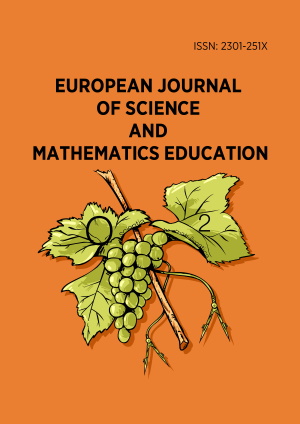Research Article
Students’ perceptions about the relevance of mathematics to other school subjects
More Detail
1 Universitetet i Agder, Department of mathematical sciences, Kristiansand, Norway* Corresponding Author
European Journal of Science and Mathematics Education, 2(2A), June 2014, 70-78, https://doi.org/10.30935/scimath/9628
OPEN ACCESS 4253 Views 2147 Downloads
ABSTRACT
Ethiopian pre-university students’ perception about the relevance of mathematics was examined within a framework of cultural historical activity theory. In particular, Engeström’s expanded mediational triangle was used. A mixed approach of both qualitative and quantitative methods was employed. Group interview was undertaken. A total of 24 students were interviewed in groups of three. The interview was supported by classroom observation. The data analysis gave rise to diverse characterizations of students’ perceptions. The identified characterizations were used to construct items of a survey questionnaire. In both the quantitative and qualitative approaches, 4 students’ categories were used for sampling: gender, grade level, stream and level of achievement. No statistically significant disparities in the distributions of perceptions were found across the students’ categories. These characterizations of perceptions are widely held by students. The results also indicate that perceptions are motivational factor for engaging in mathematics. The implications of the results for the teaching of mathematics and for the teacher education program of mathematics and other school subjects are set out.
CITATION (APA)
Gebremichael, A. T. (2014). Students’ perceptions about the relevance of mathematics to other school subjects. European Journal of Science and Mathematics Education, 2(2A), 70-78. https://doi.org/10.30935/scimath/9628
REFERENCES
- Cole, M., & Engström, Y. (1993). Cultural-historical approach to distributed cognition. In G. Salomon (Ed.), Distributed cognitions: Psychological and educational considerations (pp. 1-43). Cambridge, UK: Cambridge University Press.
- Darby, L. (2008). Making mathematics and science relevant through story, Australian mathematics teacher, 64(1), 6-11.
- Denzin, N. K. & Y. S. Lincoln (2000). Introduction: The discipline and practice of qualitative research. In N. K. Denzin & Y. S. Lincoln (eds.), Handbook of qualitative research (2nd edn.). (pp. 1-28). Thousand Oaks, CA: Sage
- Eccles, J. S., & Wigfield, A. (2002). Motivational beliefs, values, and goals. Annual Review of Psychology, 53, 109-132.
- Field, A. (2009). Discovering statistics using SPSS (3rd ed.). London: SAGE Publications.
- Gebremichael, A. T. (2013). Ethiopian preparatory students’ perceptions of the relevance of mathematics to learning goals. In B. Ubuz, Ç. Haser, M. A. Mariotti (Eds.) Proceedings of Eighth Congress of the European Society for Research in Mathematics Education, (pp. 1359-1368). Antalya, Turkey: METU.
- Gebremichael, A. T. Goodchild, S. & Nygaard, O. (2011). Students’ perceptions about the relevance of mathematics in an Ethiopian preparatory school. In M. Pytlak, E. Swoboda, & T. Rowland (Eds.), Proceedings of Seventh Congress of the European Society for Research in Mathematics Education, (pp. 1430-1439). Rzeszow, Poland: University of Rzeszow.
- Greer, B., Verschaffel, L., & De Corte, E. (2002). “The answer is really 4.5“: Beliefs about word problems. In G. Leder, E. Pehkonen & G. Törner (Eds.) Beliefs: A Hidden Variable in Mathematics Education? (pp. 271- 292). Dordrecht: Kluwer Academic Publishers.
- Hoot, J. L. Szente, J., & Mebratu, B. (2004). Early education in Ethiopia: Progress and prospects. Early Childhood Education Journal, 32, 3-8.
- Leont’ev, A. N. (1979). The problem of activity in psychology. In J. V. Wertsch, (Ed.), The concept of activity in soviet psychology (pp. 37-71). New York: M. E. Sharpe.
- Michelsen, C., & Sriraman, B., (2009). Does interdisciplinary instruction raise students' interest in mathematics and the subjects of the natural sciences? ZDM-Mathematics Education, 41, 231-244
- Ministry of Education. (1994). Ethiopian education and training policy. Addis Ababa, Ethiopia: Ministry of Education.
- Rojano, T. (2002). Mathematics Learning in the Junior Secondary School: Students’ Access to Significant Mathematical Ideas. In L. D. English (ed.), Handbook of International research in mathematics education (pp. 143-164). Mahwah, NJ: Lawrence Erlbaum Associates.
- Roth, W-M., Tobin, K., Elmesky, R., Carambo, C., McKnight, Y-M., & Beers, J. (2004). Re/Making Identities in the Praxis of Urban Schooling: A Cultural Historical Perspective. Mind, Culture, and Activity, 11, 48-69.
- Vygotsky, L. (1978). Mind in society: The development of higher psychological processes. Cambridge, MA: Harvard University Press.
- Wagaw, T. G. (1979). Education in Ethiopia: Retrospect and prospect. Ann Arbor: The University of Michigan Press


 The articles published in this journal are licensed under the CC-BY Creative Commons Attribution International License.
The articles published in this journal are licensed under the CC-BY Creative Commons Attribution International License.